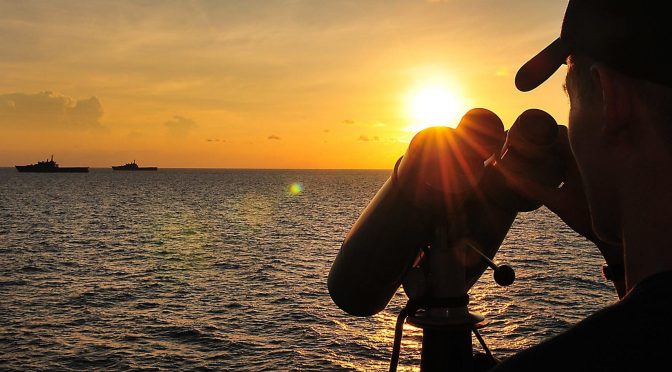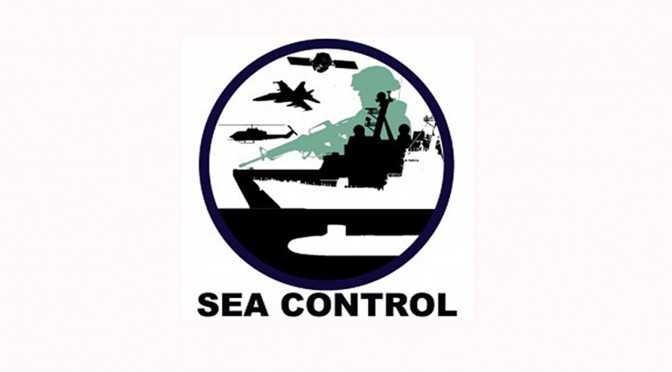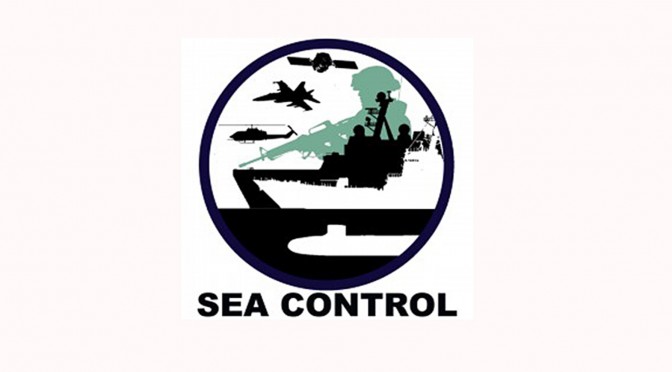By Ashley O’Keefe
Join the latest episode of Sea Control for a conversation with Rear Admiral Jeff Harley, president of the U.S. Naval War College (USNWC), to talk about the ways in which the College is adapting to a rapidly changing strategic environment. We’ll learn about the USNWC’s updated mission set, their outreach to the international community, and their part in the new renaissance in wargaming, among other topics.
Download Sea Control 135 – Rear Admiral Jeff Harley, President of the U.S. Naval War College
The transcript of the conversation between Admiral Harley and Ashley O’Keefe begins below. Special thanks to Associate Producers Roman Madaus and Ryan Uljua for helping produce this episode.
Ashley: Good afternoon, and welcome to this week’s Sea Control podcast. I’m Ashley O’Keefe, and I’m here today with Rear Admiral Jeff Harley, the president of the United States Naval War College. He’s a career surface warfare officer, and a foreign policy expert. He has a masters from Tufts – the Fletcher School – and the Naval War College, and he’s been the president here at the U.S. Naval War College (NWC) for almost a year. We’re really looking forward to this discussion. Thank you again for being here, Admiral.
Many of our listeners have heard of the U.S. Naval War College, and most know about your core mission of educating and developing future naval leaders. There have been some big developments here in the last year, with an expanding mission set and several new initiatives launched here in Newport. Can you describe some of the impetus for those changes?
RADM Harley: The big change that we have is a function of our strategic plan – meaning that we have a plan on how we’re going to keep the College relevant. When you look at the strategic environment around us, you’ll recognize the exponential change everywhere, whether it’s in leadership or in technology. The demands placed on the educational system as a result of that exponential change require that we do things to ensure our relevance. So, some of the initiatives that we have are a function of that change – of trying to keep up with that change and maintaining our relevance.
We have a number of missions here at the college, but I’d like to start out by saying that when people say we’re the U.S. Naval War College, we’re really none of those things. We’re not U.S. – we’re an international school. Of our student body, one-sixth of them, some 110 students, are international students. We are not a naval college, we’re a joint college. We have students from all over the interagency, civilian agencies, all of the different services – we are a joint college and not merely naval. We are a war college in the sense that we study war, but we truly study the constructs of peace, the understanding of policy and strategy and the interrelationships between the two, all with a goal of preventing war. And then, probably trivial, but we’re not really a college, we’re a university, because we have four or five different colleges within our system, as well as a very large research arm that includes wargaming capacity. So, we’re really none of those things –U.S. Naval War or College. If we changed our name it would be something like the ‘International Joint Peace University,’ so it would be fairly complex.
But the impetus is really the change that’s going on around us, and so we’ve expanded our missions to reflect that change and that requirement for us to maintain that relevancy. And so we also look of course for how we can make a great institution even greater.
As you said, our principal mission, the core mission upon which everything else builds, is the education and development of future leaders. That’s our student body throughput. It’s also a reflection of our distance education capability. We have hundreds of thousands of people enrolled in our distance education programs through the College of Distance Education.
In the past, we had principally four missions, and the second one would be helping to define the future Navy. Whether that’s through fleet architecture studies, or helping to red-team those studies or helping to provide the home of thought – the strategic underpinnings of those kind of dialogues.
Our third mission was to support combat readiness, and we do that through our College of Operational and Strategic Leadership. And what they do is they have a number of advise-and-assist teams that work closely with the fleets. They participate in conferences, events, and wargaming all over the world to do that.
Our fourth mission always was to strengthen global maritime partnerships, which we do on a number of levels, including the International Seapower Symposium which happens every other year, a number of regional alumni symposia, as well as the international student throughput that goes with that.
The additional missions that we’ve added in some ways reflect things that we already do, but they also reflect expansion in these areas as well. We’ve added three relatively new missions.
The first is promoting ethics and leadership. Of course, when we talk about educating and developing future leaders, we’ve always had a leadership component, but we folded in a great deal of additional study in the curriculum and are working with the Navy Leadership and Ethics Center (NLEC) to expand the impact of our education and training provided through the education system at the various touch points. That continues to expand.
The second of those three new missions is contributing historical knowledge to shape decisions. We’ve always had a strong history here reflected in world-class archives and our History Center, and we’re expanding our Maritime History Center to be a Maritime History and Research Center. We’re trying to build this into a hive of activity. Understanding history is critical. History may not repeat itself, but it certainly does rhyme, as they say. So, having a world-class history research center here is critical to our future development within the College. Of course, in the 1970s, Admiral Stansfield Turner had the Turner revolution, in which he imbued history throughout the entire curriculum, and it remains to this day part of the national treasure of being able to attend this College, the historical underpinnings that you get in terms of understanding strategy and policy.
The last mission is providing input to the international legal community. We do that through our Stockton Center. That center contributes to the international dialogue on everything from the law of the sea, to law of war, to conflict prevention and humanitarian assistance, and simply so much more. The impetus was indeed the change that’s going on around us – the need to maintain our relevance here at this extraordinary institution and these new missions are simply a reflection of that need.
Ashley: Thank you, Admiral. It must be a really exciting time to be here at the War College. When you talk about these new missions – or at least, writing down the things that were already happening to some extent – what is some of the work that you see coming out of places like the Maritime History Center, the Stockton Center, that’s exciting to you? What do you think are some of the impacts that you see coming from those places inside of the War College?
RADM Harley: Well, I would think that we’re at the forefront of so much of the thinking in so many different areas. So, illuminating history is the contribution of the History Center, again soon-to-be renamed History and Research Center. History has that critical role in so many things we do, and again, there’s so much history embedded in the institution. But also within our curriculum, providing that historical foundation, which, often for many of the students with very technical backgrounds, is the first time that they get this extent of the historical underpinning. And then the Stockton Center contributes an enormous amount at the maritime level, the national level, and the international level. On the issues of the day – key, critical issues that you see every day, such as the law of the sea issues in the South China Sea, vis-a-vis China, or the law of war, or conflict prevention, or the interfaces with the United Nations… it’s pretty extraordinary, the things that we’re doing.
I’ll just torture you with this idea of using those kind of examples of history and of the international law center as simply being a reflection of the contributions that the College makes at the national level. We’re continuing to expand how we ensure that relevancy of those seven missions. We’re doing that through what I call the “izes.”
The first of those is that we’re going to continue to operationalize the Naval War College. We’re doing that by enhancing the operations analysis that we do in concert with the Naval Warfare Development Command as well as the modeling and simulation that takes place within the Pentagon and other places. We’re operationalizing in terms of the way that we’re adding additional warfighting education to our curriculum. We’re adding particularly in terms of sea control and all-domain access. We’ve reflected the strategic environment in which we live through the stand-up of the Russia Maritime Studies Institute here last fall so now we have world-class experts in a critical area of geopolitical interest for our nation.
We also are navalizing our curriculum. We’ve always been a joint college, at least for the past several decades, but I think that we’ve become reliant on this idea that sea control is something that you already have, and in today’s world of anti-access capabilities, it’s really important that we teach sea control and maritime capabilities, all in accordance with the Chief of Naval Operations’ Design for Maintaining Maritime Superiority.
We’re also futurizing the College. We’ve got our expanded and much more robust cyber curriculum, we’re teaching unmanned systems, we’re teaching space, we’re teaching the new and emerging technologies that influence the strategic environment. Within that futurization initiative is the creation of an Institute for Future Warfare Studies, which is going to allow us to look 30 or more years out into the future, instead of the tendency to look a very short period of time out, because of exponential change. But you can study future probabilities, and you can look that far out, and you can look at force architectures that would be required to work in that environment thirty years from now.
And then the last thing that we’re doing in terms of those “izes” is that we’re internationalizing our College. And by that I mean that we’re expanding the international interfaces that we have and we’re increasing the number of regional alumni symposia that we execute with our international graduates in between our International Seapower Symposia that we conduct every two years. We’ve increased the number of Chief of Naval Operations International Fellows that we have onboard as part of our faculty. In fact, just a month ago, we brought on the former head of navy from Japan, Admiral Takei, so now Professor Takei is part of our faculty and staff. He brings a great deal of warfighting and educational experience to help shape the contours of the education that we provide both to our student body throughput, but also to our wargaming, and to our advise and assist teams that are really all over the world. This fall, we hope to bring on board the former head of navy from Norway. In doing so, we’ll have the Atlantic experience, the Arctic exposure, and obviously some NATO experience. So that will increase our CNO international fellows to four, and we’ll look to continue to expand that program because of the great skill sets that they can bring to the College and to the education for our individual students.
So those four “izes” really put into context the means and the lines of effort by which we aim to increase the relevance of this great institution.
Ashley: It’s exciting that as the College expands and creates value on so many different levels that it’s not insular, it’s really very global in perspective. And many of our listeners are in fact not in the U.S. – they’re foreign naval officers, they’re otherwise interested maritime security people. So when we think about how the College does interact, I understand that you take in foreign naval officers for education, but what are some other places where the College is collaborating internationally, maybe you could talk about the regional alumni symposia and what those bring to the table.
RADM Harley: The big effort that we make is the International Seapower Symposium here in Newport. The next one will be in the fall of 2018. That will be a largely attended event; it’ll have something on the order of 85 heads of navy here. To keep the momentum going between the International Seapower Symposia, we do hold these regional alumni symposia. About a month ago, we held one in Lima, Peru. It was focused on the Americas – all the way from Canada to South America. Simply extraordinary – we talk regional and local issues, we bring world-class experts in from the respective nations as well as from the U.S. Naval War College.
It helps us maintain the alumni relations and develop a deeper understanding of the issues that affect the regions. And we rotate, throughout the cycle, to get to all the different areas of the world. Our next one is scheduled for this fall. It will be in the Middle East, and then we’ll be in Asia in the spring, then we’ll do the International Seapower Symposium next fall, then keep the rotation going between Africa and Europe. So it’s a pretty exciting opportunity to maintain those alumni relations, and their connections to the College that many of our international student graduates have come to know and love and respect for the contributions that we make in this international dialogue.
Ashley: One more last hot topic before I let you go, sir. Everybody loves to talk about wargaming. It’s been hot since, I suppose, Sims and Luce, but today we’re talking about it as well. So what are some of the new developments? I see it pop up a couple of times in some of those new mission areas that you talked about – could you maybe just explain a little bit more what you’re doing here?
RADM Harley: I think you’re right, there’s certainly been a renaissance in wargaming, led by Deputy Secretary Work in the Pentagon, and we’ve revitalized our wargaming program in a number of different ways. We’re really focusing hard on integrating the wargaming through the ops analysis community. By that I mean with the folks who do modeling and simulation and those who do experimentation. So, there is a greater effort to have that level of integration, so that your wargaming is informed by the experimentation that’s taking place. The experimentation that you’re doing is informed by the wargaming that you’re doing – and apply that same argument to the interfaces with modeling and simulation.
We’re also slowly expanding the amount of wargaming that we do with the student body. We of course have groups that are student-led. That’s essentially their elective while they’re here at the College. But we’re trying to get wargaming exposure to every student who comes through this great college, so everybody will have an opportunity to participate in wargaming.
We’re expanding the analysis that we’re doing in the wargaming, putting the appropriate focus on the quality of the analysis to make the quality of the wargames even better through the strategic enterprise of our Navy. The scheduling of the gaming has been refined to the point to offer the optimal output for the capacity that we have, and integration with all of the other entities that do wargaming as well. So you’re absolutely right, there’s so much going on with our wargaming, with our research, all integrated into the broader Navy analytic agenda. We’re excited about the ability to imbue each and every student with a fundamental understanding of the contributions that wargaming can make.
Ashley: Well, sir, I think that you’re going to get a spike in applicants here as our CIMSEC listeners all get excited about the things that the College is doing, and just how vibrant this community is here. Is there anything else that you wanted to cover or leave our listeners with anything to close?
RADM Harley: Well, I’m humbled and honored to serve here at your USNWC. We do look forward to being able to maintain the dialogue with the international community, providing appropriate strategic thinking to our national leadership, particularly on maritime issues. We do so much to contribute to that dialogue and we’re just honored and humbled to be a part of that dialogue that takes place in this most demanding and complex of times.
Ashley: Thank you again for your time this afternoon, Admiral!
Rear Admiral Jeff Harley is the President of the U.S. Naval War College.
Ashley O’Keefe is the CIMSEC Secretary for 2016-2017. She is a U.S. Navy surface warfare officer.






